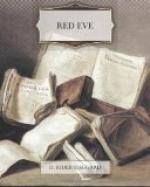Murgh turned his eyes. Following their glance, for the first time they saw Hugh de Cressi and near him Grey Dick labouring at the grave. Eve stretched out her arms and so stood with head thrown back, the light of the daybreak shining in her lovely eyes and on her outspread hair. Hugh opened his lips to speak but Murgh lifted his hand and pointed behind them.
They turned and there, not twenty paces from them, clad in armour and seated on a horse was Edmund Acour, Count de Noyon, Seigneur of Cattrina.
He saw, then wheeled round to fly.
“Archer, to your work!” said Murgh, “you know it.”
Ere the words had left his lips the great black bow was bent and ere the echoes died away the horse, struck in its side by the keen arrow, sank dying to the ground.
Then Murgh beckoned to the rider and he came as a man who must. But, throwing down the bow, Grey Dick once more began to labour at the grave like one who takes no further heed of aught save his allotted task.
Acour stood before Murgh like a criminal before his judge.
“Man,” said the awful figure addressing him, “where have you been and what have you done since last we spoke together in the midday dark at Venice?”
Now, dragged word by slow word from his unwilling lips, came the answer of the traitor’s heart.
“I fled from the field at Venice because I feared this knight, and you, O Spirit of Death. I journeyed to Avignon, in France, and there strove to possess myself of yonder woman whom here in England, with the help of one Nicholas, I had wed, when she was foully drugged. I strove to possess myself of her by fraud and by violence. But some fate was against me. She and that aged priest bribed the knave whom I trusted. He caused a dead man and woman dressed in their garments to be borne from their lodging to the plague pit while they fled from Avignon disguised.”
Here for a moment Grey Dick paused from his labours at the grave and looked up at Hugh. Then he fell to them again, throwing out the peaty soil with both hands.
“My enemy and his familiar, for man he can scarcely be,” went on Acour, pointing first to Hugh and then to Dick, “survived all my plans to kill them and instead killed those whom I had sent after them. I learned that the woman and the priest were not dead, but fled, and followed them, and after me came my enemy and his familiar. Twice we passed each other on the road, once we slept in the same house. I knew them but they knew me not and the Fate which blinded me from them, saved them also from all my plots to bring them to their doom. The woman and the priest took ship to England, and I followed in another ship, being made mad with desire and with jealous rage, for there I knew my enemy would find and win her. In the darkness before this very dawn I overtook the woman and the priest at last and set my fellows on to kill the man. Myself I would




